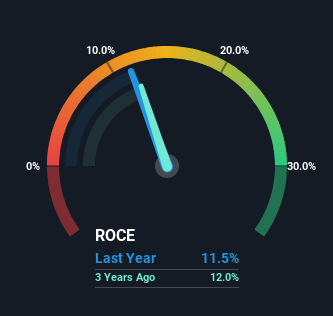- Hong Kong
- /
- Consumer Services
- /
- SEHK:1769
Returns On Capital At Scholar Education Group (HKG:1769) Paint A Concerning Picture

What trends should we look for it we want to identify stocks that can multiply in value over the long term? One common approach is to try and find a company with returns on capital employed (ROCE) that are increasing, in conjunction with a growing amount of capital employed. This shows us that it's a compounding machine, able to continually reinvest its earnings back into the business and generate higher returns. However, after investigating Scholar Education Group (HKG:1769), we don't think it's current trends fit the mold of a multi-bagger.
Return On Capital Employed (ROCE): What Is It?
If you haven't worked with ROCE before, it measures the 'return' (pre-tax profit) a company generates from capital employed in its business. To calculate this metric for Scholar Education Group, this is the formula:
Return on Capital Employed = Earnings Before Interest and Tax (EBIT) ÷ (Total Assets - Current Liabilities)
0.12 = CN¥58m ÷ (CN¥735m - CN¥229m) (Based on the trailing twelve months to June 2023).
Therefore, Scholar Education Group has an ROCE of 12%. That's a relatively normal return on capital, and it's around the 11% generated by the Consumer Services industry.
View our latest analysis for Scholar Education Group

Above you can see how the current ROCE for Scholar Education Group compares to its prior returns on capital, but there's only so much you can tell from the past. If you'd like, you can check out the forecasts from the analysts covering Scholar Education Group for free.
So How Is Scholar Education Group's ROCE Trending?
When we looked at the ROCE trend at Scholar Education Group, we didn't gain much confidence. Over the last five years, returns on capital have decreased to 12% from 54% five years ago. However it looks like Scholar Education Group might be reinvesting for long term growth because while capital employed has increased, the company's sales haven't changed much in the last 12 months. It's worth keeping an eye on the company's earnings from here on to see if these investments do end up contributing to the bottom line.
On a related note, Scholar Education Group has decreased its current liabilities to 31% of total assets. So we could link some of this to the decrease in ROCE. Effectively this means their suppliers or short-term creditors are funding less of the business, which reduces some elements of risk. Some would claim this reduces the business' efficiency at generating ROCE since it is now funding more of the operations with its own money.
The Key Takeaway
To conclude, we've found that Scholar Education Group is reinvesting in the business, but returns have been falling. And in the last three years, the stock has given away 46% so the market doesn't look too hopeful on these trends strengthening any time soon. All in all, the inherent trends aren't typical of multi-baggers, so if that's what you're after, we think you might have more luck elsewhere.
Like most companies, Scholar Education Group does come with some risks, and we've found 3 warning signs that you should be aware of.
While Scholar Education Group isn't earning the highest return, check out this free list of companies that are earning high returns on equity with solid balance sheets.
If you're looking to trade Scholar Education Group, open an account with the lowest-cost platform trusted by professionals, Interactive Brokers.
With clients in over 200 countries and territories, and access to 160 markets, IBKR lets you trade stocks, options, futures, forex, bonds and funds from a single integrated account.
Enjoy no hidden fees, no account minimums, and FX conversion rates as low as 0.03%, far better than what most brokers offer.
Sponsored ContentNew: Manage All Your Stock Portfolios in One Place
We've created the ultimate portfolio companion for stock investors, and it's free.
• Connect an unlimited number of Portfolios and see your total in one currency
• Be alerted to new Warning Signs or Risks via email or mobile
• Track the Fair Value of your stocks
Have feedback on this article? Concerned about the content? Get in touch with us directly. Alternatively, email editorial-team (at) simplywallst.com.
This article by Simply Wall St is general in nature. We provide commentary based on historical data and analyst forecasts only using an unbiased methodology and our articles are not intended to be financial advice. It does not constitute a recommendation to buy or sell any stock, and does not take account of your objectives, or your financial situation. We aim to bring you long-term focused analysis driven by fundamental data. Note that our analysis may not factor in the latest price-sensitive company announcements or qualitative material. Simply Wall St has no position in any stocks mentioned.
About SEHK:1769
Scholar Education Group
An investment holding company, engages in the provision of private education services in the People’s Republic of China and Hong Kong.
Outstanding track record with flawless balance sheet.
Market Insights
Community Narratives



